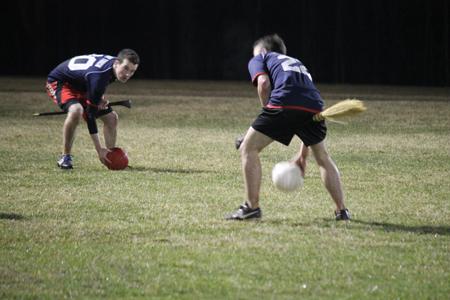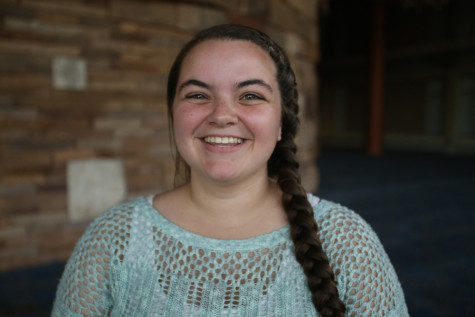The USI Quidditch team is excited for the opportunity to show the USI community what it is all about.
The team, which was founded in 2013, is a member of U.S. Quidditch, the governing body for Quidditch in the United States. Almost 200 teams around the U.S., including USI’s, are members of the organization and enjoy the services it provides.
Club Sports Director Scott Wood said when he was first approached about the club, it was more about the Harry Potter fandom and less about the sport. They were not competing in tournaments and there was no travel.
They have since become a fully competitive club sport complete with tournaments and out-of-state travel.
Time for a tournament
Now that the team is established and has been competing in tournaments regularly, it is ready to bring one to USI.
Chaser Lauren Maurer said the idea has been floating around for awhile, but Stevens is the captain who really set the plan in motion.
Maurer is excited for the tournament.
“It is finally something we can bring to USI and show some USI pride,” she said.
The tournament also gives the team a chance to invite schools who have had them out for tournaments.
The team knows this is the first opportunity for the USI community to really see them play.
“Anytime we talk to people, if they are focused enough to let us get that far, they always ask when we have our matches,” said Keller Stevens, a seeker. “We have to tell them we play out-of-state. Now we have something here for people to come to.”
Skeptics welcome
The team welcomes anyone who wants to come out and watch the tournament, but Stevens said he would really like to see the people who are skeptical of the sport come.
Maurer said she thinks some people confuse the sport with LARPing (Live Action Role Playing).
“If they came out and saw it or played they would think differently,” Maurer said. “Yes, it is something that has not been seen before. Yes, we have brooms between our legs. But it is super athletic.”
“If their point of coming is, ‘I want to go laugh at the nerds,’ I want them to do that,” Stevens said. “They won’t leave with that mindset.”
The team has seen community support, and it is not going to let some skepticism bring down its morale.
“If they want to just be the bad guys in a bad teen movies, they can do that,” Stevens said. “That’s on them.”
Skeptics and believers alike can witness the sport in action at 9 a.m. April 4.
It’s not just for wizards
A lot of different types of people and athletes participate in the sport.
Maurer started the club because of her love of Harry Potter. But she found that she really enjoyed the physical aspect of the sport as well.
She said she loves the fact that she discovered something that combined Harry Potter and the physicality she was used to because she played sports all of her life.
The members who joined because of their love of Harry Potter are the ones that come to mind if the sport is brought up, but really, a large number of students join that have never seen the movies or read the books.
“We do have people who love Harry Potter, but any Harry Potter is not necessary,” Stevens said.
It seems, he said, that the players who come just for the Harry Potter aspect are the ones who find out the sport is not what they thought.
“People who want it for just the Harry Potter aspect come out early in the season and then leave after one or two practices,” Stevens said.
Stevens, who is now captain, was a skeptical student who discovered the Quidditch team at the Spring Involvement Fair.
“I thought it looked pretty stupid,” Stevens said. “I thought it was going to be a bunch of nerds sitting around reading the Harry Potter books.”
That is a common assumption.
The sport is based on the sport played in the young adult fantasy novel series “Harry Potter.” In the books, the team members fly on their brooms attempting to score goals and catch the Golden Snitch.
This can often lead to the misconception that Quidditch is not athletic.
“I have never been more surprised by anything,” Stevens said. “It was very strange for me to go and realize it is so physical and active.”
Giving ‘traditional’ a new meaning
“If you want to play Quidditch, there is a spot for you,” Stevens said.
He said cross-country runners and football players make great Quidditch members and the team now includes swimmers and cyclists.
“We have lots of different athletes who come together and apply what they have already learned in this crazy new sport,” Stevens said.
While the sport requires strength and endurance, it does not necessarily mean that only students with an athletic background can play.
Wood said club sports like Quidditch give students the chance to be active and compete in non-traditional varsity sports.
Quidditch is not a “traditional sport,” but it holds true to many of the concepts that make a sport a sport. Players must follow the same rules and regulations during every match, and the use of the equipment does not change.
Aggressive play not rare
It is not uncommon for players to leave matches, or even practices, with scrapes, bruises or sometimes even more serious injuries.
The aggression of the sport has led to multiple concussions, twisted ankles and a torn ligament from wrist to thumb among the USI team.
“People should understand this isn’t a joke,” Stevens said. “It is a full contact sport; they don’t understand how physical and aggressive it is.”
Lucky in funding
The team is lucky in the amount of funding it receives, Stevens said.
“It means a lot to be considered an official club sport,” he said. “It gives us enough money to travel and enough money to get the equipment we need.”
Many other Quidditch teams have to raise all of their funds on their own, which limits what they are able to do competitively.
USI’s team does raise money through t-shirt sales, bakes sales and working basketball games, but Stevens said the funding they are granted really helps.
Wood said the funding depends on how long the sport has been active as a club organization, and not all fees are paid for.
They do not pay for hotels or food, but they do help with registration fees and lodging the coach or adviser for the team.
Wood said it teaches the players responsibility.
Close on and off the broom
Though the team is made up of a diverse group of players, they have bonded as team members.
“I love all of the people I play with, and a highlight of my time at USI has been all of the people I have gotten to meet,” Maurer said.
The team is very tight knit, and it is not rare for the players to spend a couple of hours together before heading to practice.
“We have the strangest diversity of players,” Stevens said. “Yet we are comfortable with each other.”




